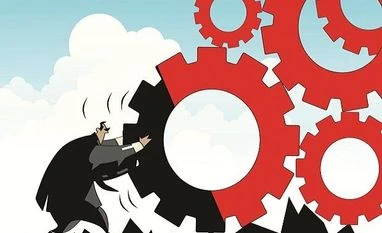A measure of economic policy uncertainty in India rose to its highest level in 81 months.
The index closed at 173.3 in May, which was 3.6 times its January value of 48.1, marking the second month of a nationwide lockdown to contain the spread of Covid-19.
The last time the index was this high was in August 2013 as the country dealt with the so-called taper tantrum. The US Federal Reserve had begun reducing the amount of money it made available for easy borrowing.
This programme of easy money was called quantitative easing (or QE) and was put in place to cushion the economy from the effects of the global financial crisis.
It had led to many investors borrowing at low interest rates in the United States and investing it for higher returns in emerging markets like India. The hint of an end to this policy caused many foreign institutional investors (FIIs) to end this trade, leading to liquidity issues as capital suddenly grew scarce in India and other emerging markets.
India has sought to deal with the Covid-19 pandemic through a series of economic measures.
Prime Minister Narendra Modi announced a plan earlier in May to provide financial support to various parts of the economy. Questions have been raised about the Rs 20-trillion package and the amount actually coming from the government. Some have pegged the actual value of the package closer to one-tenth of the announced amount.
Sreejith Balasubramanian, Economist - Fund Management, IDFC Asset Management Company, said there have been underlying structural issues in the economy even before Covid-19.
This hasn’t fully reflected as the index design looks to capture issues over which there might be uncertainty, rather than problems which are well-defined.
Existing issues included weakness in corporate, household and government balance sheets. The spike during recent times is on account of the pandemic which has resulted in lack of clarity globally too.
“Obviously, there is uncertainty everywhere,” he said.
This is likely to continue at least in the short term, he added. Global policy uncertainty has also seen a spike over the last two months. Readings have been at a record high.
Care Ratings chief economist Madan Sabnavis said the nature of the crisis has meant that governments have had difficulty in formulating policy, which is likely to be a feature for some time in India too.
“It will continue to be uncertain and it will continue to be volatile,” he said.
The government’s 2018-19 Economic Survey noted that an increase in the index value tends to coincide with a change in investments.
Companies investing in expanding their business has a positive impact on the economy. They are less likely to do so when there is less surety about how policy may change which can have an impact on their business, suggested the economic survey.
“...the analysis indicated that an increase in economic policy uncertainty dampens investment growth in India for about five quarters. One standard deviation increase in uncertainty leads to about one percentage point decline in investment growth rate. Thus, economic policy uncertainty materially impacts the investment climate in the country,” it said.
Unlock 30+ premium stories daily hand-picked by our editors, across devices on browser and app.
Pick your 5 favourite companies, get a daily email with all news updates on them.
Full access to our intuitive epaper - clip, save, share articles from any device; newspaper archives from 2006.
Preferential invites to Business Standard events.
Curated newsletters on markets, personal finance, policy & politics, start-ups, technology, and more.
)